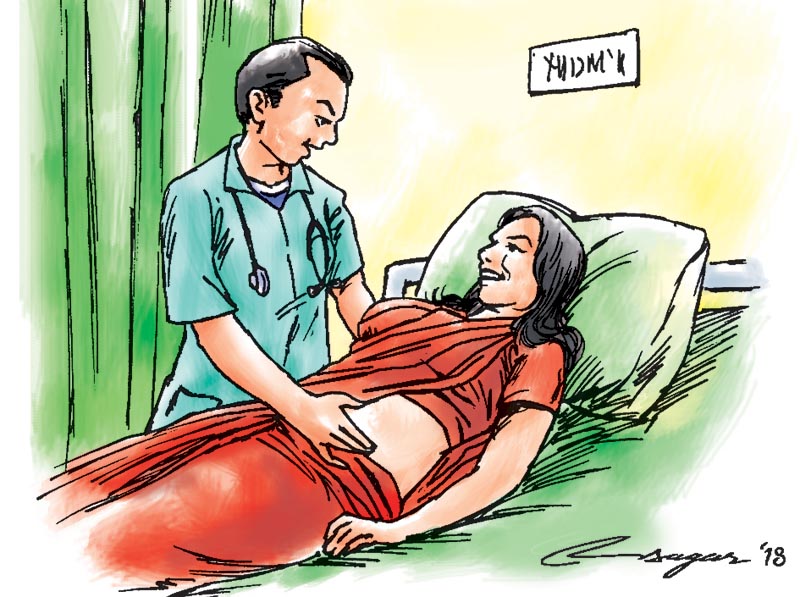Nepali men in nursing: It’s time males became nurses
If Nepali women are breaking the medical barrier, should not men be able to become nurses? After all, nursing is about more than ‘care’. It’s a vocation and professionally acclaimed. It’s not merely a job
I’m often asked: “Why did you become a nurse, when you could have studied medicine?” Rather than laugh in derision and scoff at the inquisitor, I take stock of my seemingly valiant decision and consider the origins of his or her question.
Raised in a liberally democratic nation that espouses informality and multi-culturalism, by an Austrian-Lebanese mother and father of Irish ancestry, the world seemed avant-garde and magnanimous. It wasn’t until I reached mid-adolescence, surrounded by “Aussie blokes”, that I started realising masculinity—at least stereotypically—formed the bedrock of the country’s national identity. The development of the virile ideal has—for decades—conditioned cultural norms in Australian society, constructing a set of qualities to which men must adhere: stoicism, assertiveness and bravado, all while being easy-going and carefree. Following an unconventional pathway, therefore—namely the acquisition of a bachelor degree in nursing, a profession “for women”—meant working against such deep-rooted and unwavering ideals; it was never going to be easy. Change, and diversity, never are.
Fortunately, I was not the first man to dip my toes into objectionable waters, and I certainly will not have been the last. Despite the dearth in male nursing peers in classes at university and colleagues at work post-graduation, I never wavered from my initial plan. In fact, it made me resolute; it highlighted a culture in desperate need of transformation. Promisingly, according to the Australian Bureau of Statistics, in 2011, 10 per cent of all Australian nurses were men. Statistics paint a variant picture of the profession in Nepal.
Culturally speaking, in terms of male dominance, Nepali society is not entirely dissimilar to that of Australia. Despite ethnic pluralism dominating cross-sections of mainstream civilisation, with strong patriarchal archetypes penetrating to the core, stepping outside the box of “acceptable practice” can present seemingly insurmountable obstacles. For women, particularly those within the profession, working under patriarchal patronage has signified responsibility without authority, and widespread disempowerment. For men, it went a step further: it was deemed illegal to enter the profession post-1990. However, the law— but perhaps not yet culture—has changed, and is now permitting the re-entry of men into nursing.
Given the increase of male nurses across the globe and the propensity for nurses in general to make a significant impact on the lives of patients, is not it about time Nepali men—and the government—championed change?
Concerns arise, however, regarding said change. It’s debated that due to a culturally dominant historical legacy of male dominance, involving even one man in a group of professional women could further marginalise females, stripping them of their voice by handing it to “the man”. This being said, women are doctors in Nepal, assertive in their respective roles, commanding respect as they go. Cannot men work collaboratively with women in the nursing domain too, for the greater good of the patient, ultimately shifting the paradigm away from gender segregation to equality and partnership?
Times may change, and the new generation could emerge with diverse ideals to those of their predecessors. Can cultural norms, ones that have historically followed pre-determined patterns, shift so that men and women can work together—collaboratively—to champion the improvement of healthcare for Nepali society? At the end of the shift, should the debate not boil down to quality of healthcare provision, and that which is best—and most culturally safe—for each patient?
Since graduating as a male nurse in 2014, the world has become my proverbial oyster. I’ve floated into illustrious positions, taught at university, and now travel the world to volunteer my nursing skills wherever required.
Misaligned attitudes—at least in my opinion—will always exist, as will misogynistic ideals and patriarchal influences. However, they should never dominate tyrannically, to the point of oppression. Nursing, although characterised by the philosophy of care, is not solely “a job for women”. The status quo needs to be broken globally.
Aside from caring for vulnerable, disempowered and scared people daily, nurses are impactful, often transforming the healthcare experience of said people by means of a single touch or smile. We teach communities about primary health care, improve the quality of care through personal attributes, advocate for those without a voice and generally make a difference to patients’ lives. It’s a fundamental role, suited to both gender groups.
Linked intimately to having an impact, nurses are often reported to be among the happiest professionals. Derived in part from the helping nature of the role, it’s perhaps an overarching sense of humanity that sends us back to the hospital day after day. If Nepali women are breaking the medical barrier, should not men be able to become nurses? After all, nursing is about more than “care”. It’s a vocation and professionally acclaimed. It’s not merely a job. Nepal’s constitution reflects gender equality. Should not the culture-coin be flipped—on this occasion—to include men in nursing, a profession historically dominated by women?
McGarry is a registered nurse in Australia






